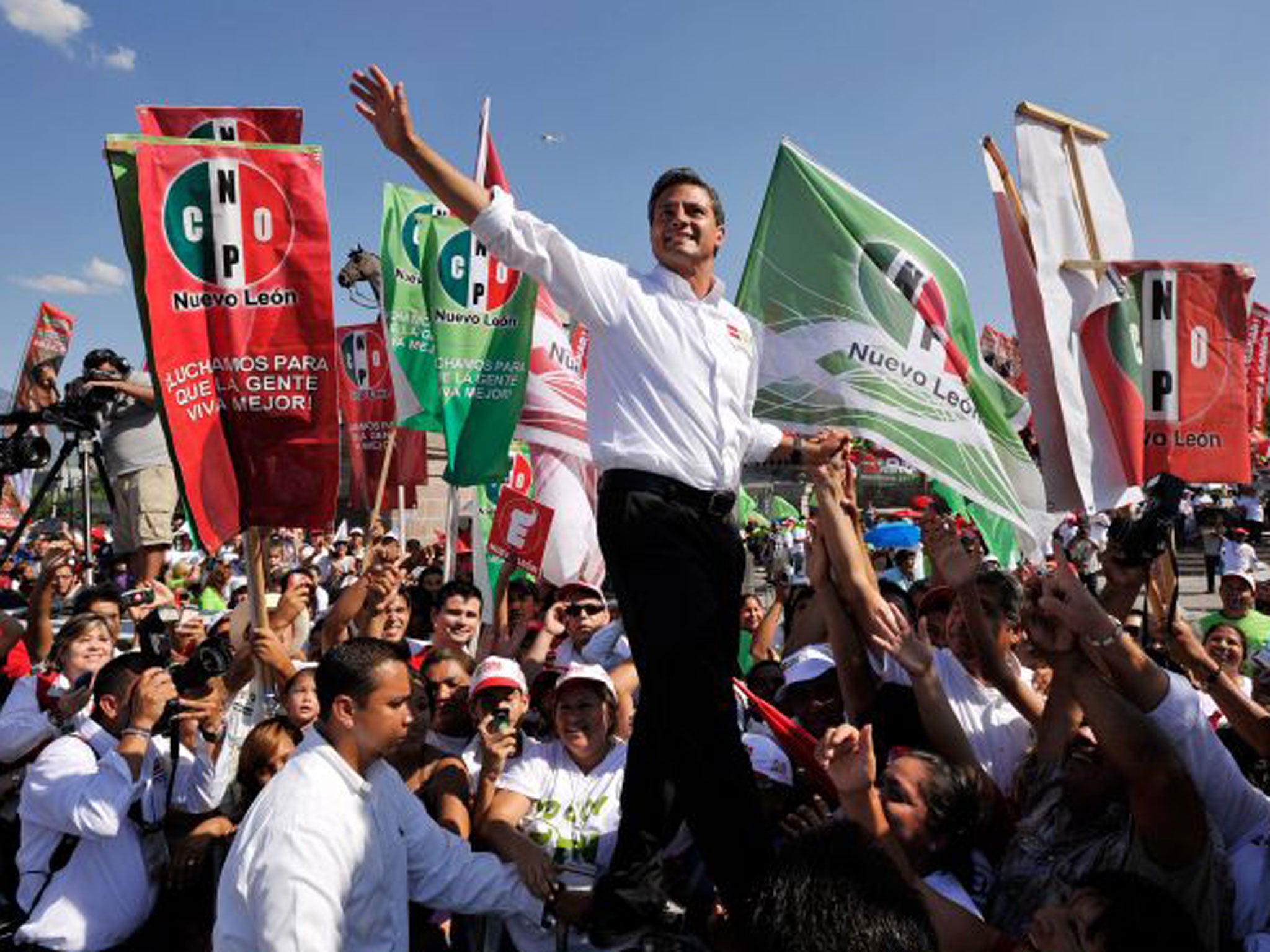Stakes are high as Mexico's new President bids to end the bloodshed caused by drug conflict
Enrique Peña Nieto takes office with calls to pursue the drug barons and protect the public

As he is sworn into office as Mexico's new president today, Enrique Peña Nieto may privately wonder if his campaign promises to slash the death toll from his country's ferocious drug conflict can ever be fulfilled.
Despair at the bloodbath is what drove millions of Mexicans to vote for Mr Peña Nieto and his reviled Institutional Revolutionary Party, or PRI, whose previous corruption-riddled, 71-year rule ended in 2000 after it was finally forced to stop rigging elections.
The telegenic 46-year-old former state governor has vowed not to enter unwritten deals with the cartels – as the PRI is widely thought to have done in the 1990s – and to carry on the pursuit of the drug barons. "We will continue working strongly to combat drugs and insecurity with innovative policies so that consumption [within Mexico] falls," said Emilio Lozoya, widely tipped for a cabinet post.
Mr Peña Nieto's proposed reforms include the creation of a new 40,000-strong paramilitary police force, a major increase in the numbers of the existing federal police, and centralising security decision-making in the hands of his interior minister.
Yet many in Mexico regard that as rearranging the deckchairs on the Titanic. According to the national statistical office, INEGI, 72 per cent of Mexicans believe the security situation will remain the same or worsen.
"He will change the rhetoric of the security strategy, although operationally I think little will change," said Carlos Ramírez, an analyst with Eurasia political risk consultants.
That may be because the primary drivers of the violence – US demand for illicit drugs and the cartels' arsenal of high-powered firearms bought legally north of the Rio Grande – remain outside the president's control.
Yet one important clue to Mr Peña Nieto's strategy to reduce the bloodshed is his plan to take off the streets the 45,000 soldiers and 17,000 marines that his predecessor, Felipe Calderón, of the conservative National Action Party, used to combat the drug gangs.
Many analysts believe that removing the military from the equation may, on its own, be enough to see the violence subside.
Mr Calderón, who will now take up a teaching post at Harvard University, took that desperate measure as a response to the drug-lords' ability to buy off corrupt police of even the highest rank.
And, unlike the police, the army and navy were able to outmatch the firepower of the cartels. As a result, the death toll surged and some 60,000 Mexicans perished in the conflict during Mr Calderón's six-year term.
Yet the militarisation of counter-narcotics policy is widely viewed as a failure, with the armed forces being linked to repeated human rights abuses. Meanwhile, the cocaine arriving in the United States via Mexico during Mr Calderón's term is thought to have increased by more than 90 per cent.
Ultimately, Mr Calderón, who staked his presidency on winning his full-frontal assault on the traffickers, ended up urging the White House to consider decriminalising cocaine and other drugs.
Mr Peña Nieto has already ruled out taking a similar position. He is also keen to switch the focus onto economic issues, including his proposed shake-ups of the tax code and energy sector. Mexico's economy, already the 14th largest in the world, is expected to grow by about four per cent this year, and within a decade will overtake Brazil as Latin America's largest.
Yet many remain excluded from that rapid growth, which is fuelled largely by manufacturing. While telecoms tycoon Carlos Slim is the world's richest person, 46 per cent of Mexicans – 52 million people – remain mired in poverty.
Pemex, the creaking state oil monopoly that provides 40 per cent of government revenues, has seen its output fall 26 per cent since 2004 to 2.5 million barrels of crude oil per day. Mr Peña Nieto wants to open it to private investment but without relinquishing government control of an industry whose nationalisation in the 1930s remains an almost mythical source of national pride.
As he moves on those different fronts, he will also have to tread the fine rhetorical line between paying frequent homage to the PRI's populist roots in the Mexican revolution while defending the party's 1990s conversion to the free market. As if all that were not enough, Mr Peña Nieto also lacks a congressional majority and faces widespread scepticism that his clean-cut good looks are matched by political savvy.
As he takes his first steps as president in the coming days, 112 million Mexicans will be watching, hopefully – and not a little anxiously – for signs that this young politician is up to the Herculean challenges his country faces.
Drug wars by numbers
60,000
Estimated number of people killed in drug violence during Felipe Calderon’s six years in power
$2bn
The amount the US channelled to Calderon’s government to tackle narcotics
25,000
Number of people estimated missing during the last six years
Subscribe to Independent Premium to bookmark this article
Want to bookmark your favourite articles and stories to read or reference later? Start your Independent Premium subscription today.

Join our commenting forum
Join thought-provoking conversations, follow other Independent readers and see their replies